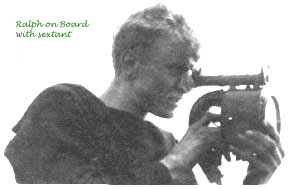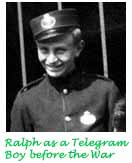

|
|||||
| Ralph Stobart Robson, signalman, life in the British Royal Navy World War Two, sinking of Prince of Wales and the Repulse, Singapore | |||||
|
|||||
|
|||||
|
From the Clyde I was to proceed to Hong Kong where I had been posted. Within a week of our arrival in Singapore, Japanese troops had landed on the beaches of Siam, Pearl Harbour had been attacked and Singapore and Hong Kong were under threat of invasion. My plans for reaching Hong Kong had to be abandoned. My journey had begun at Chatham and marked a new stage in my life. I had left the Northern Wave at Londonderry about three weeks before, returning from Patrol Service to the regular Royal Navy. I travelled from Londonderry via Belfast to Larne thence via Stranraer to Lowestoft and finally to Chatham. We were carried by Duty Lorry to the barracks. This was my first visit and I was greeted by an ornate arched gate. On to the Regulating Police office to report in. Chatham Barracks was centred around the barrack square. The square was an oblong running east to west with the focal point at the east end. On the south side were the old brick barrack blocks. They stood between the high wall on the south side of the parade ground and a chalk cliff. They must have been built at some time after the Napoleonic Wars. They were tall, multi storey buildings and housed most of the barrack's ratings. I was allotted to new huts at the far (east end) of the Parade Ground, which occupied new ground behind trees and bushes. The east end was where the Commodore of the barracks took the salute and it was the place where all the hands fell in every morning. They fell in by divisions; seamen, gunners, stokers, communications, etc. After inspection by the Chiefs, the officers did the same and then the whole naval force had to stand to attention while the White Ensign was hoisted. The officers then reported to divisional heads and the whole lot was reported to the Commodore. This was classed as bullshit by the ratings. The parade was then dismissed and marched away to their various duty stations. For us this was the Signal School. On the north side of the barracks were a lot of smaller offices such as the Signal School, Police or Regulating Office, etc. and we usually found time to visit the Drafting Office where details of drafts were displayed. The following morning I fell in on Barrack Square (the Parade Ground) and, after Divisions, went to the Drafting Office to see if there was any postings. Reported to Signal School. Saw the Yeoman of Signals and after taking my details was told to join class in semaphore practice. What a bore! After more than 18 months at sea and never seeing semaphore used once. After a morning break for tea, I discovered the secret of "Chats". The main thing was to find some way of dodging during the day. This was achieved by sliding away after the allotment of some duty or other and I found it easy to slide away at teabreaks. You then had all the time in the world to waste, but it was necessary to have some indication that one was legitimately employed. Some favoured a ladder, if one could be found and hidden during off-duty hours. It could then be propped up against any wall and Jack could stand with a disengaged look, or wander the barracks with it stopping at intervals as if engaged in onerous duty. The ladder had one huge drawback. It involved work; anathema to any true Jack. The other method was a piece of paper. Not any old piece of paper, but something that looked official. I managed to purloin some unused envelopes from the Signal Office and carefully wrote different addresses on them. I was now ready and they proved very useful during the next few days. My forenoon and afternoon were successfully covered. I could wander untroubled round the barracks, keeping out of the way of PO's and Officers. Getting outside the barracks was an entirely different matter as they were surrounded by a huge wall which was replaced at intervals by an ascent-proof barb wire fence. Meals were taken in a canteen in the huts. Nights, however were spent in a tunnel in the cliff behind the old red brick barrack blocks due to the risk of air raids. Everyone was issued with a hammock (which I had never used before) which you carried into the tunnel where it was slung. The tunnel was hardly idyllic as it was full of farting and snoring Jacks . I slept in the tunnel for two nights then took to sneaking back to the barracks behind the hedges where it was safe enough if you were not discovered. Two days after I arrived I went to the drafting office to see if there was a draft for me which there wasn't and on turning to come away who should I discover behind me but Harry Clasper. This was an old friend from Blaydon, a smallish man married to a large woman who was bigger than Harry and enormously fat. I waited until he looked at the board and when he came back to me I realised that something had happened. Harry said "I've got a draft!". So I waited until he came out of the office. He came out all smiles. He said "I've been drafted to submarines at Blyth". After a little more conversation we said goodbye. I discovered afterwards that after he had completed the submarine course he was drafted to a sub which went on patrol and never came back. First duty after Divisions was to report to the Drafting Office to look at the notice board to see if you had been drafted. I was there for about 6-7 days and on going to the drafting office on this morning I dicovered that I had been drafted. It was to "Party Piano". no one seemed to know where it was going or what it was. The draft was to consist of communications ratings, sparkers and bunting tossers and coders. The person in charge was a P.O. Telegraphist with 2 leading rates (i.e. two leading Telegraphists) the rest of the group were ordinary signalman and telegraphists together with the coders who had been posted from Billy Butlins Holiday Camp at Skegness which had been converted to a Communications School. This was in the morning and between then and 5 o'clock at night there were a number of things to be done. We had to get all our gear together, the P.O. had to get his instructions and we also discovered that we also had to get an issue of tropical clothing. I knew then that it was some place between Freetown in Africa and Hong Kong. I was delighted because a) I was getting out of the war (death or glory had never appealed to me) and b) I was going to see a large part of the world I'd always wanted to see because Party Piano, as we found out, was taking us as far as Hong Kong. It was at 4 o'clock in the afternoon that we gathered at the drafting office and found there a 30 cwt truck waiting equipped with a canvas top and sides to which were fastened planks providing seating accommodation. We were carried on this duty lorry across London to Euston for onward passage to Gourock. At Euston we had to place our luggage in the baggage car and find accommodation on the train. We ended up in an open coach with no sleeping accommodation. I slept on the luggage rack. They used to say I was like a monkey and I had to act like a monkey to get onto the rack. Most of the journey was in darkness, dim lights etc. as all of the train was blacked out. The only thing on the train which coudn't be blacked out was the funnel, which threw out about one foot of flame and smoke which could be seen from a considerable distance. This was considered to be a danger and the result was that when the train was warned it would be stopped and the fire would be dampened down. This happened twice on the journey and as a result the train was considerably late. All the luggage which could be was placed on the floor of the coach. I was on the luggage rack when the train was brought to a sudden halt and the pressure of the braking threw me from the rack onto two people who were lying on the ground. Turned out to be a WAF and a soldier engaged in an illicit poke on floor. Absolute pandemonium. Two very embarrassed people made a quick exit at the next stop and I'm sure it wasn't the station they were intending to get off at. One stop at Preston for tea and sandwiches provided by the dear old W.V.S. We arrived at Gourock in the early morning. |
|||||
|
|||||
